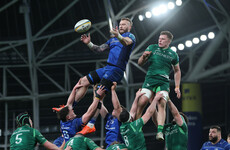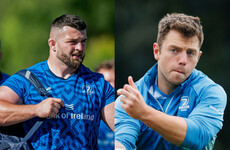FOR THE FOURTH successive campaign, Galway and Roscommon will meet in the Connacht SFC final on Sunday.
Roscommon have won just one of their last four provincial finals encounters with the Tribesmen (the 2016 final went to a replay), prevailing two years ago in Salthill to capture their first crown in seven years.
If they were to seal a third Nestor Cup since 2010 this weekend, it would make this their most fruitful decade in Connacht since the 1970s, when they delivered four titles between ’72 and ’79.
Roscommon, who reached this point by enjoying their first championship win over Mayo in Castlebar since 1986, haven’t taken out the ‘big two’ in Connacht in the same season since 2001.
The Rossies don’t have the best record against Galway in the championship. They’ve averaged one win over the Tribesmen in the last three decades, with their last three victories arriving in 2017, 2001 and 1990.
Galway have racked up eight wins in their last 10 Connacht outings against Roscommon, including a 16-year unbeaten run between 2001 and 2016.
But those statistics will count for little when the ball is throw-in at Pearse Stadium on Sunday afternoon.
The steel Anthony Cunningham has infused into the Roscommon side was notable in the shock semi-final defeat of league champions Mayo. They won’t be intimidated by the prospect of taking on the All-Ireland semi-finalists, particularly given Galway’s stuttering form so far this season.
Kevin Walsh has bemoaned Galway’s “relentless” injury problems in the build-up to this encounter. Star forward Damien Comer (foot) and midfielder Ciarán Duggan (knee) will definitely miss out, while double-leg break victim Paul Conroy is unlikely to feature.
Kieran Molloy is battling an ankle injury and the contingent of Peter Cooke, Sean Kelly, Adrian Varley and Declan Kyne have returned to training but are lacking match fitness.
Of the Galway team that started in the semi-final against Sligo, there were just six survivors from the 2018 Connacht final: Seán Andy Ó Ceallaigh, Gareth Bradshaw, Thomas Flynn, Shane Walsh, Johnny Heaney and Ian Burke.
The Roscommon team has evolved even more in the past 12 months. David Murray, Tadgh O’Rourke and Niall Kilroy were the only players who started the recent win over Mayo and last year’s provincial final.
Their team named to play on Sunday features an additional trio who started last year – Conor Devaney, Diarmuid Murtagh and Enda Smith.
Cunningham made some key additions to the squad since he took over in the winter.
He recalled goalkeeper Darren O’Malley to the set-up and the Michael Glaveys club man pointed three important long-range placed balls against Mayo.
Bringing Kerry native Conor Cox on board has proved an astute move and he’s taken both Leitrim and Mayo for five points in his first two championship outings in the primrose and blue.
Of the 12 points they scored against Mayo, 0-9 were hit by players who weren’t even on the panel in 2018 – Cox (0-5), O’Malley (0-3), and Andy Glennon (0-1).
Conor Hussey and the three Daly brothers – Niall, Conor and Ronan – form a much-changed defence that’s been protected by a deep-lying half-forward line.
Devaney, Kilroy and Smith will all filter back in front of the half-backs when Roscommon are without the ball. Cathal Cregg will play as a link man in front of inside pair Murtagh and Cox – who’ll be expected to do the bulk of the scoring.
Cunningham will be well aware that improvements will be needed if his side are to dethrone Galway. They were well beaten in two major statistical categories against Mayo – kick-outs and breaking ball around the middle third.
Roscommon also conceded 36 shots and ultimately it was profligacy in front of posts – where Mayo fired 15 wides - that denied James Horan’s team the victory.
Roscommon experienced problems on their own restarts, winning just seven of O’Malley’s 19 kick-outs in the first period. It’s an area Galway are likely to target on Sunday.
With skyscrapers Thomas Flynn and Fiontán Ó Curraoin paired in midfield, O’Malley will try to avoid aerial contests around the middle. Galway’s press from restarts caused Colm Lavin major problems in last year’s final.
The home side had fared well in the kick-out battle until Cathal Compton went down injured after half an hour. From that point, Galway lorded the middle sector.
The Tribe came away with 54% of Lavin’s kick-outs and scored four points directly off them. Flynn claimed six Roscommon restarts on his own, while Galway won 76% of Lavelle’s kick-outs.
Bernard Power has since assumed the number one position from Lavelle and Galway will be hoping for a similar dominance from his restarts. Smith’s likely presence as a third midfielder should help the visitors in the battle for the airwaves.
Of the 16 points Galway kicked last year, five were frees inside 25 metres – which were easy scores for free-taker Shane Walsh.
Roscommon managed just 1-1 and failed to score from play in the second-half of last year’s final. They scored 2-6 (1-4 from play) in total from 25 shots.
With a potent front three of Cox, Murtagh and Cregg, they’ll need to be more efficient in attack if they’re to win this one.
The majority of their wides 12 months ago were low percentage shots from outside the scoring zone as Galway’s defensive approach frustrated the hosts and forced them into taking pot-shots from the wings.
Roscommon’s shooting efficiency was 58% against Mayo and they’ll need to improve on that figure as space and scoring opportunities will be at a premium against Galway’s packed defence.
With Cregg acting as an out-ball in the number 11 position for counter-attacks, Roscommon will be aiming to get Cox and Murtagh in one-on-one situations with long and early kick-passes before Galway’s blanket can filter back.
Last year’s clash between these sides turned into a chess match. The winning of the game came down to Galway’s better efficiency in front of goals in addition to their dominance on kick-outs and at midfield. Sunday’s game is likely to be decided by similar metrics.
The42 is on Instagram! Tap the button below on your phone to follow us!















Kickouts and midfield will simply be the winning and losing of this game. Roscommon are probably stronger at both ends of the field this year but considerably weaker in midfield. If killoran and o’rourke can somehow manage to hold their own, id be quietly confident in a ross win.
@Jack: I really fear for Roscommon in midfield. If Galway puts on a big press, ros goalie will have no option but to go long. Roscommon’s best midfielder lined out for New York this year. It was the turning of the game last year when he went off injured.
Very wary of Roscommon. Galway can’t afford to be wasteful in the forwards. Shane Walsh is a wonderful player but lacks consistency and until he gets that he’ll never be one of the greats. Hopefully this year he can
The key to winning this game for Roscommon will be getting Shane Kiloran on the ball. He makes things happen. If he’s on his game, the Rossies will win the key midfield area and get the ball to the inside forward line.
“The majority of Roscommon wides 12 months ago were low percentage shots from outside the scoring zone as Galway’s defensive approach frustrated the hosts and forced them into taking pot-shots from the wings”
The same should be said about Mayo’s wides v Roscommon a few weeks ago but instead It was there profligacy in front of posts that denied James Horan’s team the victory hmm…
I think the midfield will be closer than expected. O Curraoin and Flynn are tall men, but their fielding has left a lot to be desired in the past. There’s more to being a midfielder than just being tall. Also, given Mayo wides were so important in the semi-final, it’s worth noting Galway have a serious tendency to kick wides when put under any pressure. Roscommon will crowd Galway’s forwards out, and there’ll probably only be about two of them up there to begin with. Expecting a dour game from two defensive managers.